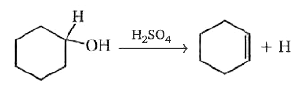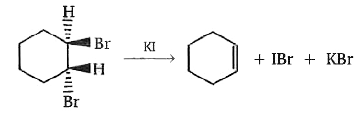Which of the following reaction is endothermic?
CaCO3→CaO+CO2
Fe+S→FeS
NaOH+HCl→NaCl+H2O
CH4+2O2→CO2+2H2O
The correct Answer is:A
To determine which of the given reactions is endothermic, we need to analyze each reaction based on the energy changes involved. An endothermic reaction is characterized by the absorption of heat, resulting in a positive change in enthalpy (ΔH > 0).
1. Identify the Reactions:
We need to look at the provided options and identify the type of reaction each represents.
2. Analyze the First Reaction:
The first reaction involves the decomposition of a compound (e.g., calcium carbonate). Decomposition reactions typically require energy to break bonds, which means they absorb heat. Therefore, this reaction is endothermic.
3. Analyze the Second Reaction:
The second reaction involves the formation of an ionic compound (e.g., FeS). Formation reactions generally release energy because they go from a less stable state (individual ions) to a more stable state (ionic compound). Thus, this reaction is exothermic.
4. Analyze the Third Reaction:
The third reaction is a neutralization reaction (e.g., between a strong acid and a strong base). Neutralization reactions typically release energy as bonds are formed in the product (water). Therefore, this reaction is also exothermic.
5. Analyze the Fourth Reaction:
The fourth reaction is a combustion reaction, which involves a substance reacting with oxygen to produce oxides. Combustion reactions are always exothermic because they release a significant amount of energy.
6. Conclusion:
Based on the analysis, the first reaction is the only endothermic reaction among the options provided.
Final Answer:
The endothermic reaction is the first reaction (decomposition of a compound).
---
We need to look at the provided options and identify the type of reaction each represents.
The first reaction involves the decomposition of a compound (e.g., calcium carbonate). Decomposition reactions typically require energy to break bonds, which means they absorb heat. Therefore, this reaction is endothermic.
The second reaction involves the formation of an ionic compound (e.g., FeS). Formation reactions generally release energy because they go from a less stable state (individual ions) to a more stable state (ionic compound). Thus, this reaction is exothermic.
The third reaction is a neutralization reaction (e.g., between a strong acid and a strong base). Neutralization reactions typically release energy as bonds are formed in the product (water). Therefore, this reaction is also exothermic.
The fourth reaction is a combustion reaction, which involves a substance reacting with oxygen to produce oxides. Combustion reactions are always exothermic because they release a significant amount of energy.
Based on the analysis, the first reaction is the only endothermic reaction among the options provided.
The endothermic reaction is the first reaction (decomposition of a compound).
Topper's Solved these Questions
Similar Questions
Knowledge Check
- Question 1 - Select One
Which of the following reactions is endothermic ?
CaCO3(s)→CaO(s)+CO2(s)
Fe(s)+S(s)→FeS(s)
NaOH(aq)+HCl(aq)→NaCl(aq)+H2O(l)
CH4(g)+2O2(g)→CO29g)+2H2O(l).ACaCO3(s)→CaO(s)+CO2(s)BFe(s)+S(s)→FeS(s)CNaOH(aq)+HCl(aq)→NaCl(aq)+H2O(l)DCH4(g)+2O2(g)→CO29g)+2H2O(l). - Question 2 - Select One
Which of the following reaction is an elimination reaction ?
A B
B C
C Dboth (a) and (b)
Dboth (a) and (b)
Which of the following process is not endothermic?
View SolutionWhich of the following reactions is a decomposition reaction ?
View SolutionWhich of the following reactions is not a disproportination reaction ?
View SolutionWhich of the following is an endothermic reaction?
View SolutionWhich of the following reaction in the blast furnace is / are endothermic ?
View SolutionWhich of the following reaction in the blast furnace is / are endothermic ?
View Solution

